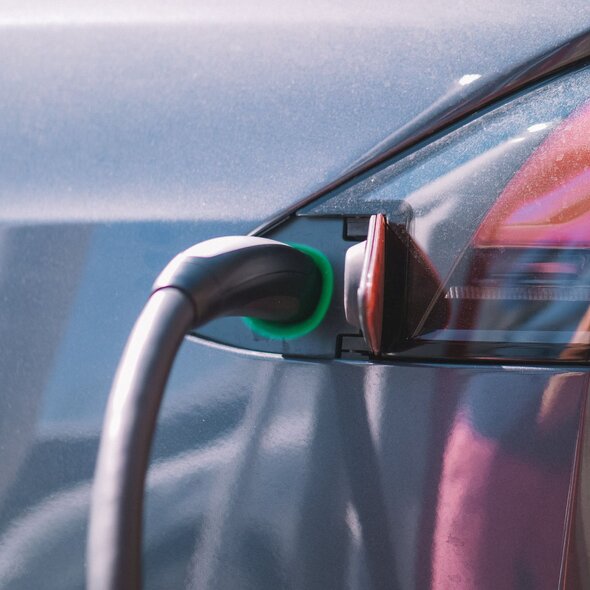
ELECTRIC VEHICLES
Electric VS Gas Cars: An In-Depth Comparison
In this article, we'll explore:
- The key differences in the functioning of electric motors and internal combustion engines.
- Financial considerations, including tax credits, maintenance costs, and long-run savings.
- Convenience factors such as charging stations for EVs and gas station availability for gas cars.
Last Updated February 5, 2024
10 min read
The debate between electric cars and gas cars has become more relevant than ever, especially with the growing awareness of environmental issues and the advancement in automotive technology. At Roam, where we specialize in car subscriptions, we recognize the importance of understanding the differences between these two types of vehicles. This comprehensive guide will delve into an in-depth comparison of electric vehicles (EVs) and gasoline-powered cars, helping you make an informed decision based on your needs and preferences.
Understanding the Basics: Electric Motor vs. Internal Combustion Engine
How Electric Cars Work
Electric cars operate using an electric motor powered by batteries, which can be recharged at charging stations or at home. Unlike gas vehicles, EVs don't produce tailpipe emissions, making them an environmentally friendly option. The technology in electric cars has advanced significantly, offering improved range and performance.
The Mechanics of Gasoline-Powered Cars
Gas cars use an internal combustion engine, where fuel combustion powers the vehicle. These vehicles are still dominant on the roads and are known for their longer range and quick refuelling capabilities. However, they contribute to pollution and are affected by fluctuating gas prices.
Financial Aspects of Owning Electric and Gas Cars
Initial Costs and Tax Credits
When considering buying an electric car, it's important to note that EVs can have higher initial costs compared to gas-powered cars. However, many governments offer tax credits and incentives to offset these costs. These incentives can make EVs more financially viable in the long run.
Maintenance Costs and Fuel Savings
EV owners often benefit from lower maintenance costs as electric cars have fewer moving parts than gasoline-powered vehicles. This means less wear and tear and lower chances of mechanical issues. Additionally, charging an electric car can be more cost-effective than fueling a gas car, especially with the rising gas prices.
Range, Charging, and Refuelling
Electric Vehicle Range and Charging Infrastructure
One of the main concerns for potential EV owners is the range – the distance an electric car can travel on a single charge. Modern EVs have significantly improved in this aspect, offering ranges that are suitable for daily commuting and even long journeys. However, the availability of public charging stations, although increasing, can be a limiting factor. Many EV owners choose to charge at home, which requires a home charging setup.
Gas Cars: Range and Refuelling Convenience
Gasoline-powered cars generally offer longer ranges than EVs and the convenience of a vast network of gas stations for quick refuelling. This makes gas cars a reliable option for long-distance travel and areas where EV infrastructure is still developing.
Environmental Impact: Electric Cars vs. Gasoline Cars
The Green Advantage of Electric Vehicles
Electric vehicles (EVs) have a clear advantage when it comes to environmental impact. They produce zero emissions at the tailpipe, which significantly reduces air pollution compared to gasoline cars. Furthermore, when charged with renewable energy sources, EVs can be almost entirely carbon-neutral. This aspect is crucial in the fight against climate change and is a major driving force behind the growing popularity of electric cars.
Emissions and Efficiency of Gasoline Cars
In contrast, gas cars rely on the combustion of fossil fuels, releasing carbon dioxide and other pollutants into the atmosphere. Despite improvements in fuel efficiency and cleaner emissions technology, gasoline cars still have a larger environmental footprint compared to electric cars.
Driving Experience: Comparing Electric and Gasoline Vehicles
The Quiet and Smooth Ride of Electric Cars
Electric cars are known for their quiet operation and smooth acceleration, thanks to the instant torque provided by electric motors. This can make for a more pleasant and responsive driving experience, especially in urban settings. Many EV owners appreciate the quieter cabin and the overall calmness that comes with driving an electric vehicle.
Performance and Familiarity of Gasoline Cars
Gasoline cars, on the other hand, are often praised for their performance, especially when it comes to higher-end models and sports cars. The sound and feel of a gasoline engine have a traditional appeal that many drivers enjoy. Additionally, for those accustomed to gas cars, there's a sense of familiarity and predictability in their performance and refuelling process.
Future Trends in the Automotive Industry
The Shift Towards Electric Mobility
The automotive industry is witnessing a significant shift towards electric mobility. With advancements in battery technology, increasing public charging infrastructure, and government incentives, electric cars are becoming more accessible and practical for everyday use. This trend is expected to continue, with many car manufacturers committing to expanding their electric vehicle lineups in the coming years.
The Ongoing Role of Gasoline Cars
While the focus is shifting towards electric vehicles, gasoline cars will continue to play a role in the automotive landscape for the foreseeable future. Hybrid vehicles, which combine an internal combustion engine with an electric motor, offer a transitional technology for those not ready to fully commit to an all-electric vehicle. As the infrastructure and technology for EVs continue to improve, the balance may shift more towards electric mobility.
Conclusion: Choosing the Right Vehicle for You
Deciding between an electric car and a gasoline car depends on various factors, including your driving habits, environmental concerns, budget, and personal preferences. Electric cars offer environmental benefits, lower running costs, and a unique driving experience, but they require consideration of charging infrastructure and range. Gasoline cars provide familiarity, longer range, and quicker refueling but come with higher fuel costs and environmental impact.
Ultimately, the choice between electric and gasoline cars is a personal one, influenced by individual circumstances and priorities. As the automotive world evolves, both types of vehicles offer distinct advantages, making it an exciting time for consumers to explore their options.
Try a Roam Car Subscription today
Book your first car subscription in minutes and leave the burdens of traditional car ownership behind.
